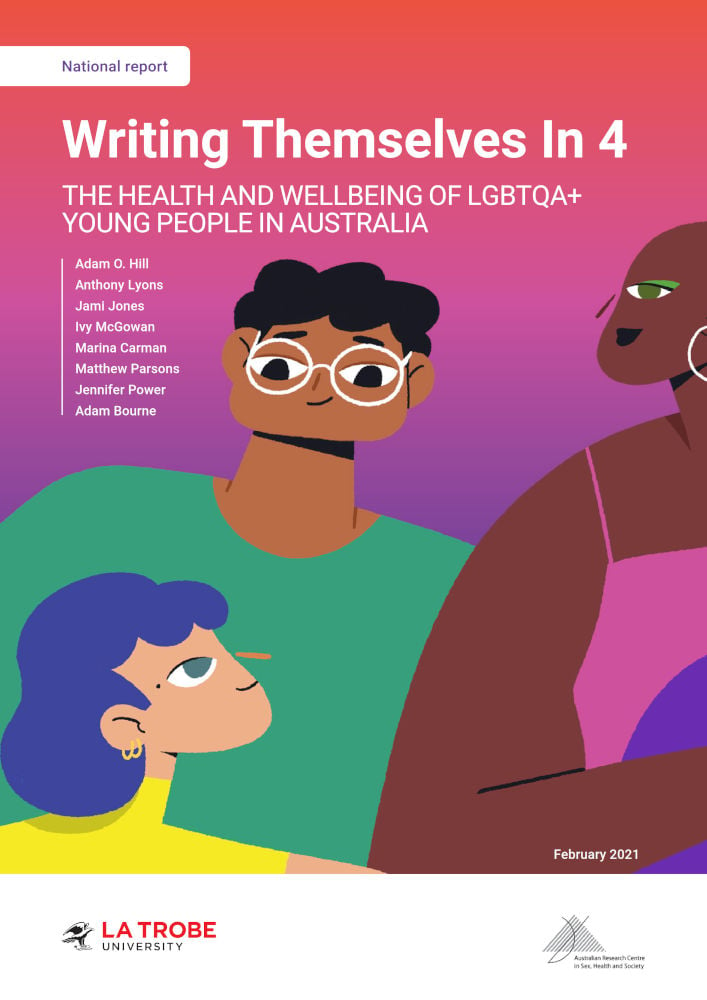Writing Themselves In 4
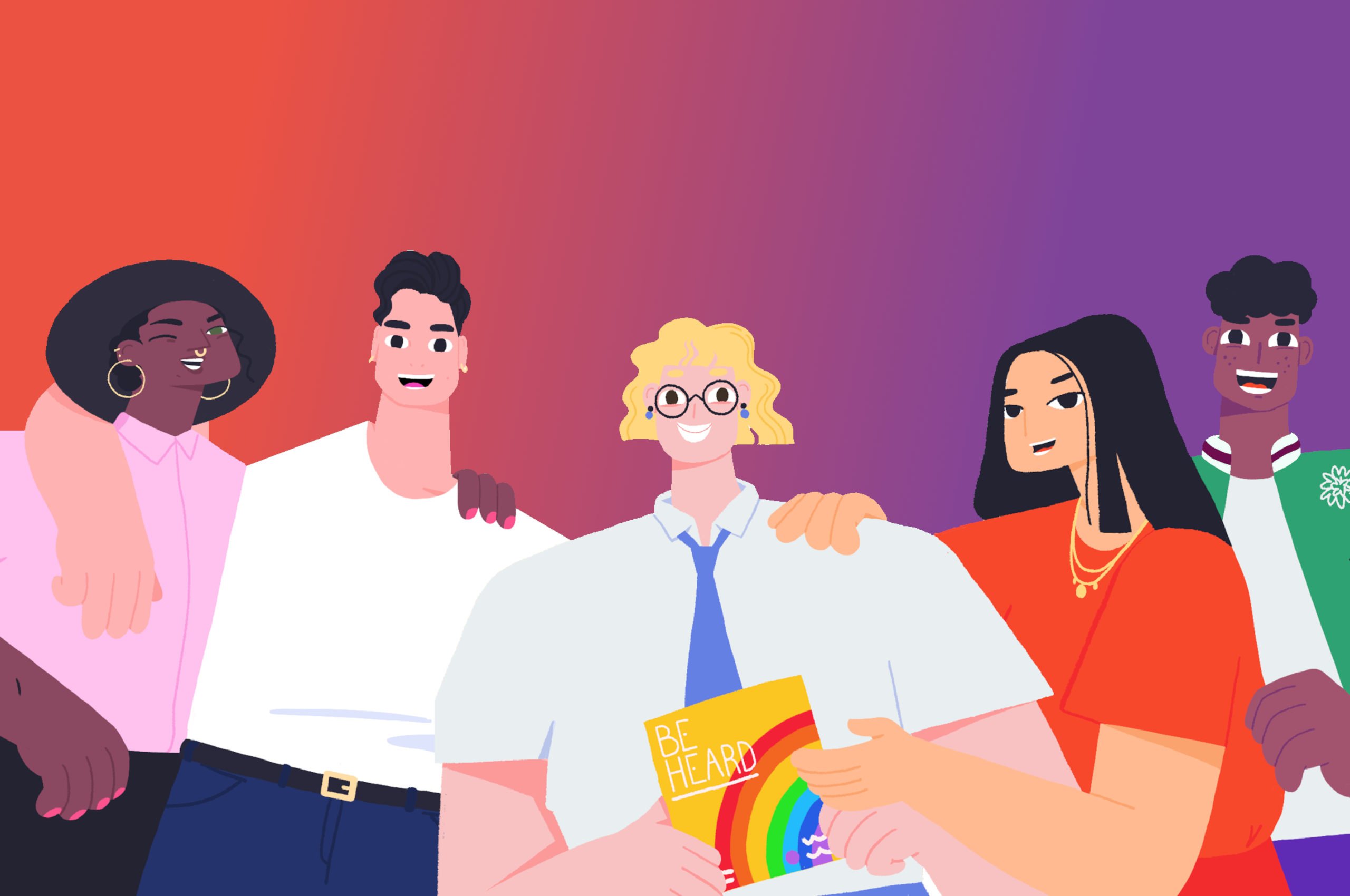
The health and wellbeing of LGBTQA+ young people in Australia
2020-2021
In 2019, the Australian Research Centre in Sex, Health and Society (ARCSHS) at La Trobe University, with support from Rainbow Health Australia and Rainbow Network, surveyed 6,418 LGBTQA+ people aged 14 to 21 about their experiences with education, homelessness, harassment, assault, mental health, community connections, and more. This landmark study is the largest of its kind ever conducted in Australia, providing an unprecedented insight into the lives of LGBTQA+ young people.
The national report presents these findings alongside key recommendations for action.
Writing Themselves In 4: Key figures slide set
This slide set provides an accessible means of utilising key figures and data included in the Writing Themselves In 4 National Report. The slides are available to download under a CC-By attribution for use in presentations relating to LGBTQA+ health and social wellbeing. Individual slides can be copied in their entirety but should not be edited, and must be attributed to ARCSHS.
State and Territory summary reports
These reports summarise key findings from Writing Themselves In 4 that are specific to the participants who were residents in the Australian Capital Territory, New South Wales, South Australia and Victoria at the time of completion. They are designed to complement the national report by providing data relating to specific topics broken down at the state/territory level.
These reports cover issues that can at times represent challenges for LGBTIQA+ young people (such as mental health, discrimination or abuse) as well as aspects of life that can enhance health and wellbeing (such as supportive relationships and community engagement).
For access to these reports in an alternative format, please contact us.
Writing Themselves In 4 ACT summary report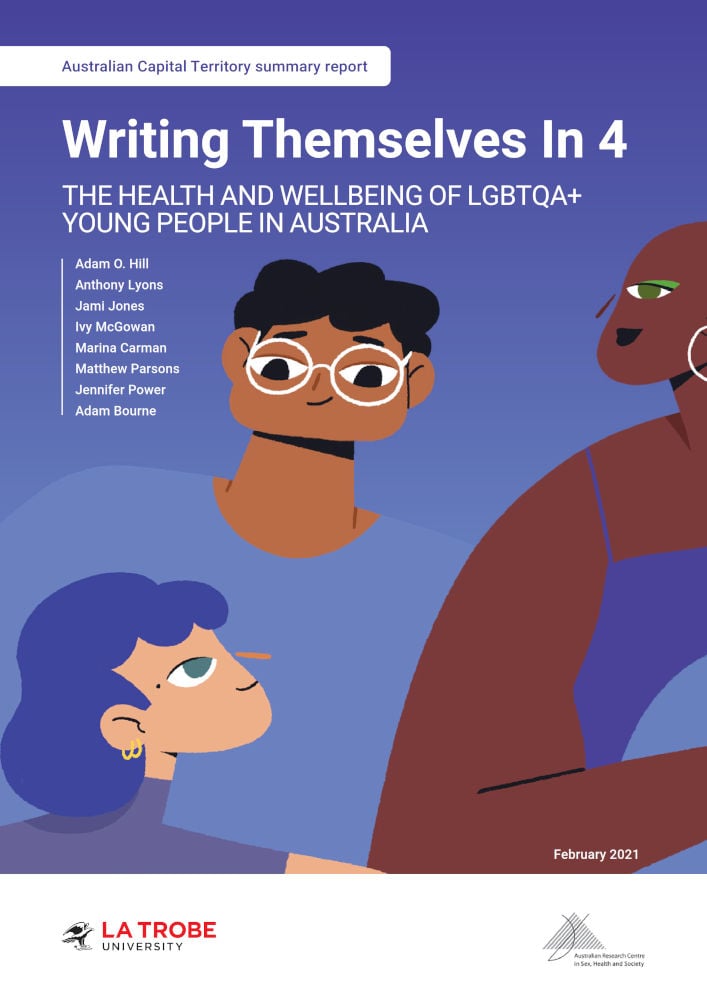
Findings from a survey of LGBTQA+ people from the ACT aged 14 to 21 about their experiences with education, homelessness, harassment, assault, mental health, community connections, and more, alongside key recommendations for action.
Download the Writing Themselves In 4 ACT summary report
Writing Themselves In 4 NSW summary report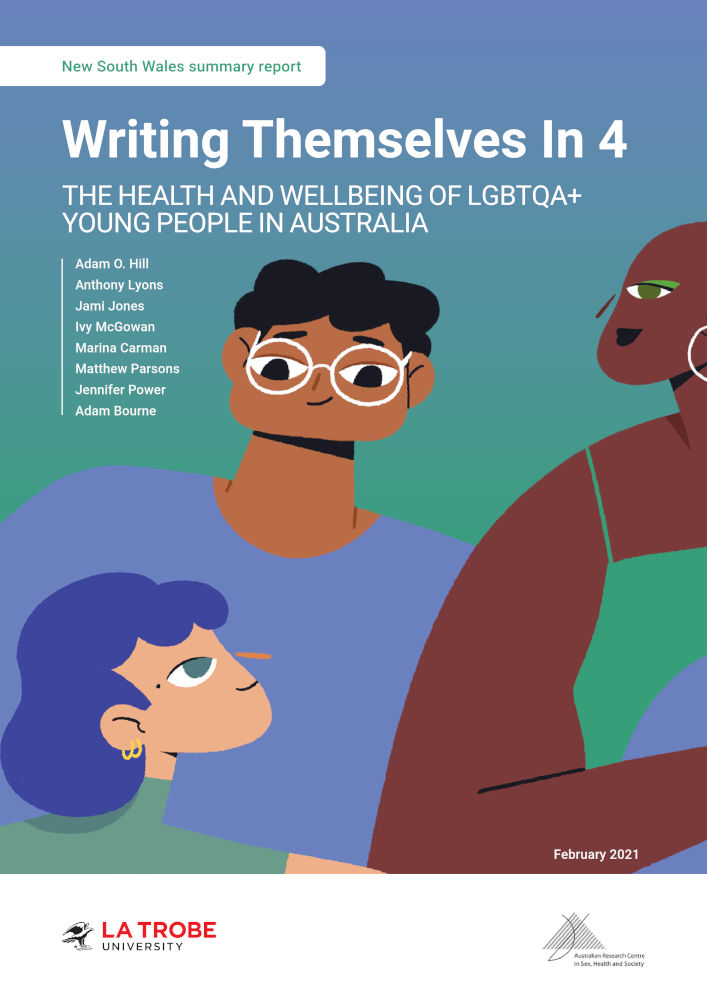
Findings from a survey of LGBTQA+ people from NSW aged 14 to 21 about their experiences with education, homelessness, harassment, assault, mental health, community connections, and more, alongside key recommendations for action.
Download the Writing Themselves In 4 NSW summary report
Writing Themselves In 4 South Australian summary report
Findings from a survey of LGBTQA+ people from South Australia aged 14 to 21 about their experiences with education, homelessness, harassment, assault, mental health, community connections, and more, alongside key recommendations for action.
Download the Writing Themselves In 4 South Australian summary report
Writing Themselves In 4 Victorian summary report
Findings from a survey of LGBTQA+ people in Victoria aged 14 to 21 about their experiences with education, homelessness, harassment, assault, mental health, community connections, and more, alongside key recommendations for action.
Download the Writing Themselves In 4 Victorian summary report
Researchers
Adam O. Hill, Anthony Lyons, Jami Jones, Ivy McGowan, Marina Carman, Matthew Parsons, Jennifer Power, Adam Bourne
More work based on Writing Themselves In 4 data
The ARCSHS research team has been conducting further analyses of data from Writing Themselves In 4 (often in combination with data from our other studies) to generate more nuanced knowledge of the experiences of LGBTQ people.
Aboriginal and Torres Strait Islander LGBTQA+ factsheets 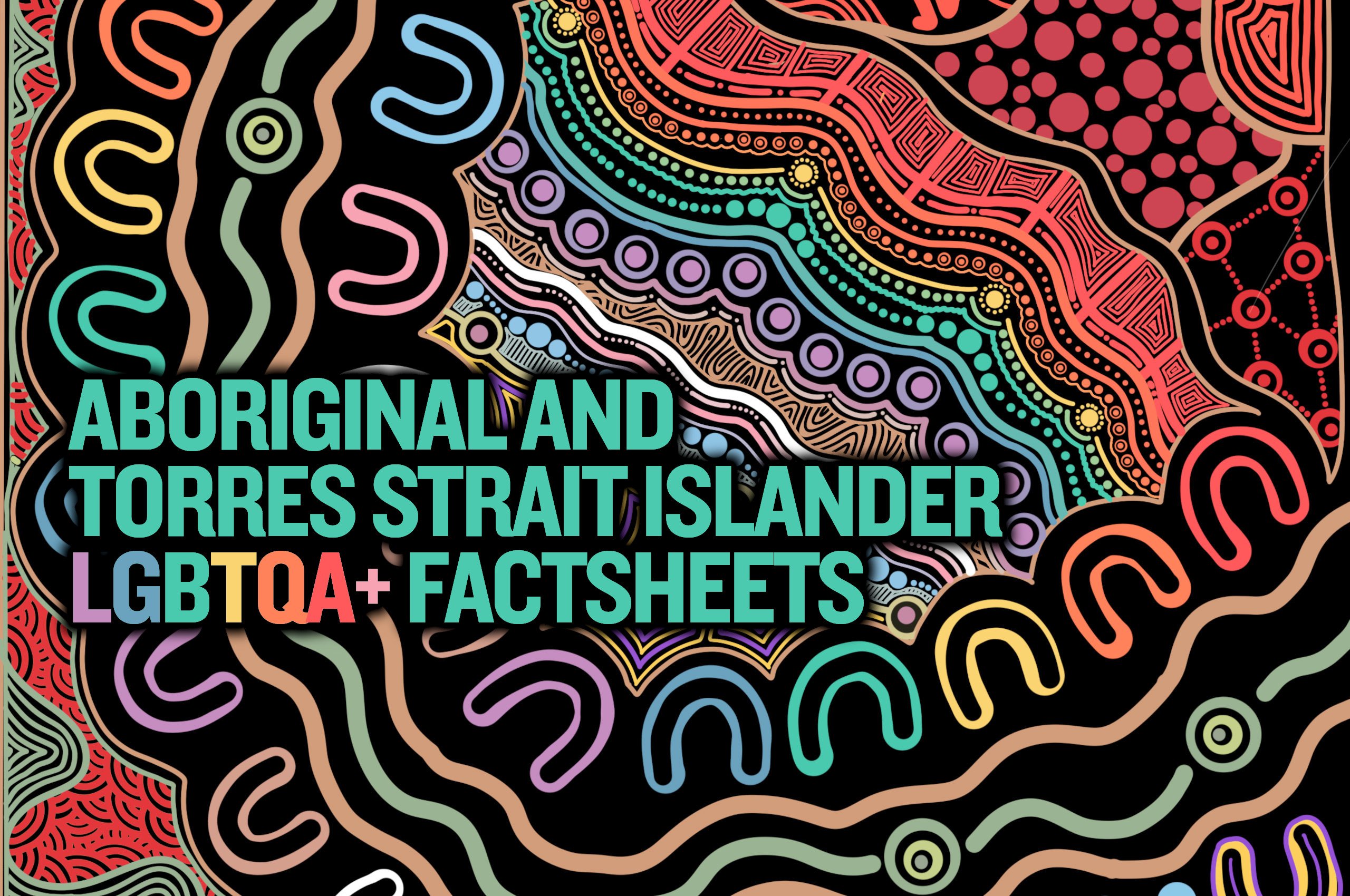
Between 2017 and 2020, several national surveys of LGBTQA+ people across Australia were conducted by the Telethon Kids Institute (now the Kids Research Institute Australia) and by ARCSHS. These included:
- Trans Pathways: a study of trans and gender diverse young people and their mental health and care pathways
- Private Lives 3: a study of health and wellbeing among LGBTQ+ adults (aged 18+)
- Writing Themselves In 4: a study of health and wellbeing among LGBTQA+ young people (aged 14-21)
Each of these studies heard from some LGBTQA+ people who were also Aboriginal and/or Torres Strait Islander. To highlight their specific and unique experiences, this project sought to draw together the responses from these LGBTQA+ Aboriginal and Torres Strait Islander people and present them in a series of factsheets.
Browse the Aboriginal and Torres Strait Islander LGBTQA+ factsheets
LGBTQA+ mental health and suicidality briefing papers 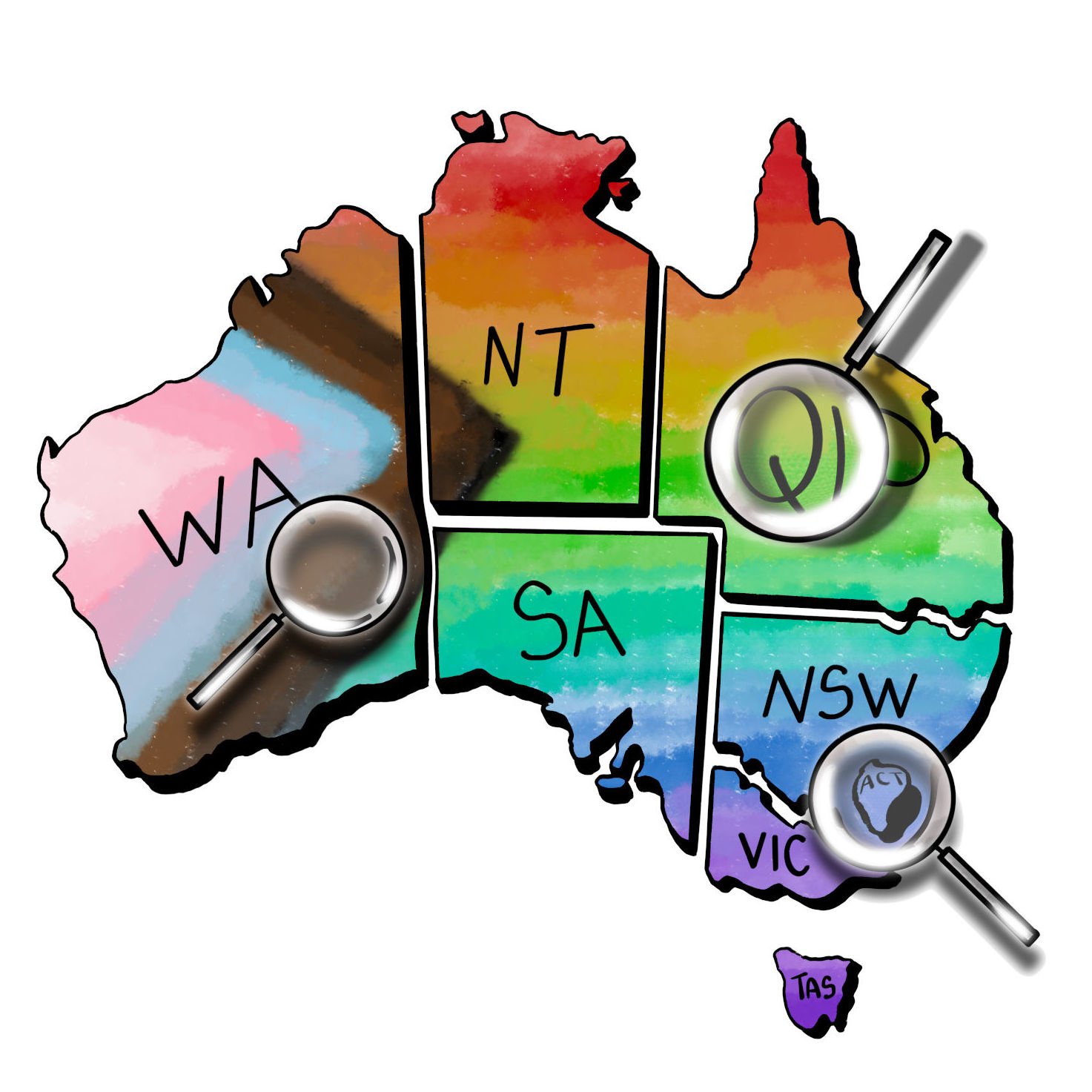
Drawing from Private Lives 3, Writing Themselves In 4 and Pride and Pandemic, these reports document the rates and associations of mental health and suicidality for LGBTQA+ community members at the State and Territory level in Australia. Across eight individual reports, analyses focus on State- and Territory-level rates of suicidality, mental ill-health, healthcare service access and modalities, risk factors such as discrimination and harassment experiences, and protective factors such as community- and school-based belonging. Each report also documents the association between these factors and levels of suicidality within each State and Territory in Australia.
To establish a broader context for these results, each report also provides comparative estimates between (a) the State or Territory results with general population estimates in Australia from the Australian Bureau of Statistics, and (b) a comparison between States and Territories (broadly) from the available data. Lastly, these reports also provide an assessment of each State or Territory's current policy and programming context (along with an assessment at the Primary Health Network level) to establish ways of furthering policy and health reform at the State and Territory level.
Browse the LGBTQA+ mental health and suicidality briefing papers
Rainbow Realities 
The Rainbow Realities report was commissioned by the Commonwealth Department of Health and Aged Care to inform development of the 10-year LGBTIQA+ Health and Wellbeing Action Plan. Rainbow Realities provides a synthesis of pre-existing findings as well as more than 50 new analyses derived from the data of six surveys of LGBTQA+ populations in Australia, including Private Lives 3, Writing Themselves In 4, SWASH, Trans Pathways , Walkern Katatdjin (Rainbow Knowledge) and Pride and Pandemic.
The report has been thematically organised into 10 chapters relating to either a key determinant or contributing factor to LGBTQA+ health outcomes, or a topic of particular interest: Mental health and suicidality; income inequality; housing and experiences of homelessness; discrimination and abuse; family violence and sexual assault; alcohol and other drugs; relationships; parenting and sexual and reproductive health; gender affirmation and trans affirming practices; general healthcare; Aboriginal and Torres Strait Islander people and intersectional identities.
Download the Rainbow Realities report Read more about Rainbow Realities
Violence, abuse, neglect and exploitation of LGBTQA+ people with disability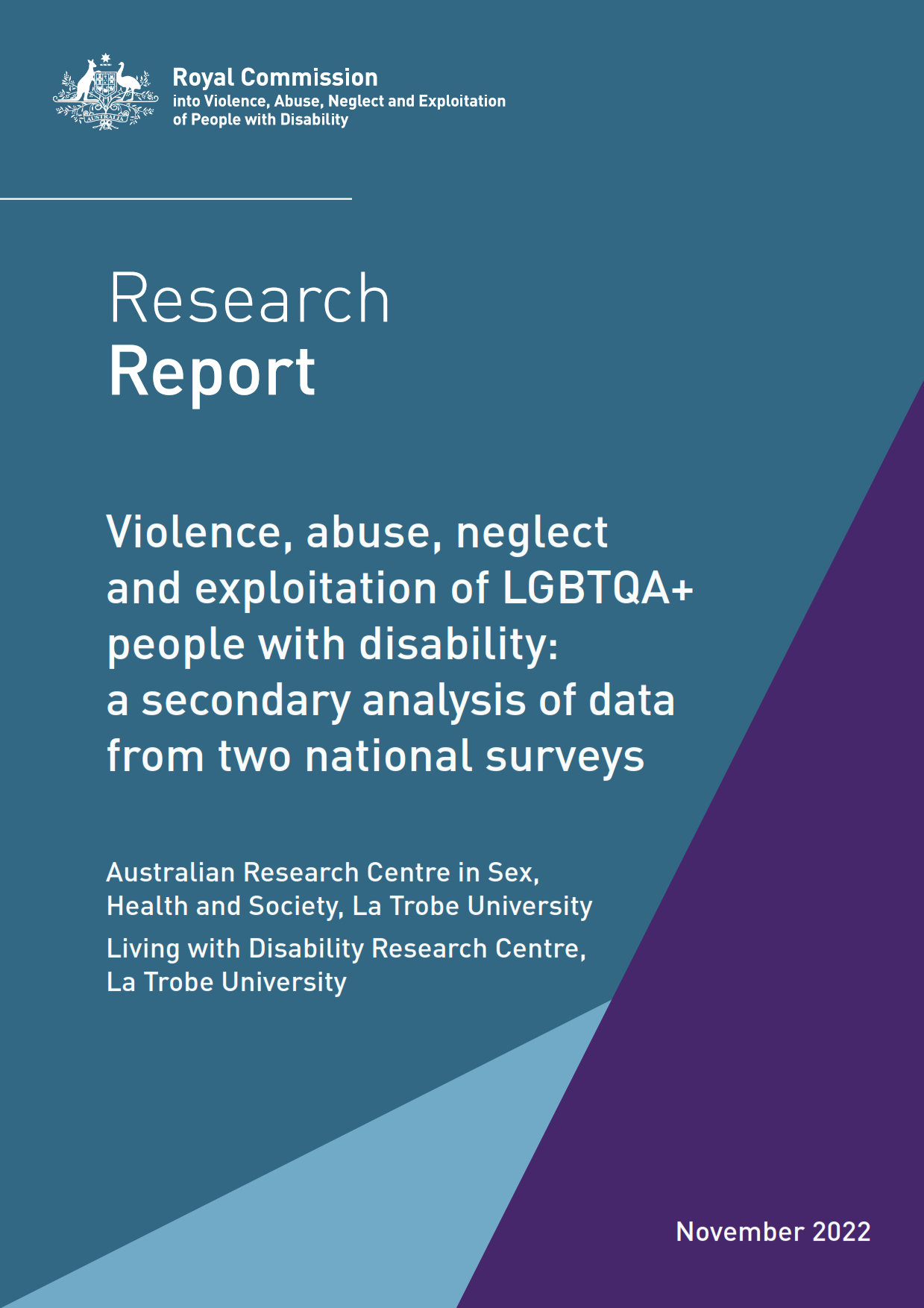
A secondary analysis of data from two national surveys
This report was compiled to inform the Royal Commission into Violence, Abuse, Neglect and Exploitation of People with Disability. It presents data on the experiences of lesbian, gay, bisexual, trans and gender diverse, queer and asexual (LGBTQA+) people with disability in Australia from Private Lives 3 and Writing Themselves In 4.
The report covers a wide range of experiences and issues of concern for LGBTQA+ people with disability. This includes: disclosure of sexuality or gender identity to others, and feelings of acceptance or support when doing so; feelings of safety (or otherwise) at work, in educational contexts and in LGBTQA+-specific spaces; experiences of harassment, abuse and discrimination; family and intimate partner violence; mental health or experiences of suicidal ideation or attempt; and feelings of connection to communities of people living with disability and/or those who are LGBTQA+.
Download the LGBTQA+ people with disability report Read more about the report
Journal articles
The Writing Themselves In 4 research team is currently preparing a range of journal articles that focus in on specific issues in more detail. These will be added to this webpage as they are published online.
If you are unable to access the links below, please contact arcshs@latrobe.edu.au.
Our data finds that access to gender affirming care is associated with reduced psychological distress, decreased recent suicidal ideation, and increased gender euphoria. Legal gender affirmation is correlated with lower psychological distress and increased gender euphoria. Participants desiring hormone therapy but not accessing it reported higher psychological distress.
Exploring trans youths’ future orientations as a product of experiences of dis/affirmation
Trans youths’ future orientations are important but seldom discussed within the literature. Compared to their cisgender peers, the developmental trajectories of this group are characterised by considerable change, and highly subject to prevailing political climates. Here, we explore trans youths’ future orientations as a product of present-day experiences of identity-affirming factors.
Residential location can significantly impact the mental health, wellbeing, and community involvement of lesbian, gay, bisexual, transgender, and queer/questioning (LGBTQ) young people. While research has explored geographical differences in LGBTQ adult wellbeing, limited knowledge exists regarding LGBTQ young people’s experiences. Using a large Australian cross-sectional survey of 6,620 LGBTQ individuals aged 14–21, this study examined the associations between residential location and wellbeing outcomes.
Understanding the distribution of recent deliberate self-harm among young LGBTQ+ Australians
Deliberate self-harm (DSH) is a high prevalence experience for lesbian, gay, bisexual, trans, non-binary and queer (LGBTQ) youth. These behaviours are associated with significant morbidity and suicidality and constitute a risk factor for future impairment. Presently, there is little understanding about how DSH burden is distributed among LGBTQ youth in Australia, and how engagement is shaped by biographic factors.
This study examined the correlations between different types of gender affirmation - medical, legal and social - and various health and wellbeing outcomes among trans young people in Australia.
Homeless LGBQ+ youth were found to face high levels of bullying at school, which leads to increased distress and higher truancy rates. This study suggests that addressing bullying and supporting these youth are crucial for helping them stay engaged in their education and reducing the risk of future homelessness.
This qualitative study analysed the open-text responses of 4751 young people in response to the question 'What makes you feel good about yourself?’ The findings suggest the importance of ensuring access to mental health services and social/support programs while also acknowledging young people’s agency and the significance of everyday, informal acts which support them to achieve desires for connection, acceptance, contribution, belonging and self-expression.
This study identified factors associated with both lifetime and recent experiences of homelessness among LGBTQA+ youth. Analyses also found associations between recent experiences of homelessness and experiences of harassment, alcohol consumption, and psychological distress.
A large proportion of this sample of LGBTQA+ young people with disability reported experiences of verbal, physical, and sexual abuse based on their sexual orientation or gender identity in the past 12 months. The study explores factors associated with these experiences and highlights an urgent need for preventing and addressing experiences of abuse in this population.
LGBTQA+ young people who report being a part of an affirming educational institution or workplace experience, not only lower psychological distress, but also greater subjective happiness. These findings were true for both cisgender sexual minority and trans and gender diverse young people.
Experiencing homelessness was associated with higher levels of alcohol consumption and higher prevalence of experiencing verbal, physical and sexual harassment, but only modestly associated with higher levels of psychological distress. Homelessness risk and burden is unevenly distributed among LGBTQ+ youth and is linked to outcomes which may potentiate future homelessness.
Religious Conversion Practices and LGBTQA + Youth
This paper examines how the experience of conversion practices aimed at changing a young person’s sexuality or gender identity is associated with poor mental health outcomes, providing evidence in support of legislation that bans these practices.
This paper examines the factors and forces that shape the experience of suicidal ideation and suicide attempt among this group of young people within the Writing Themselves In 4 sample. It describes how verbal, physical and/or sexual harassment or assault are strongly associated with an increased likelihood of suicidal ideation or attempt. The paper also demonstrates how those from a religious family or household, and those living in regional or rural areas were more likely to have this experience.
This paper examines the patterns of illicit drug use among LGBTQA+ young people, including who might be most likely to perceive their own use as problematic.
Young trans people face elevated rates of poor mental health and well-being outcomes. Affirming their gender in ways that are meaningful to them has important implications for these outcomes. However, limited research has examined the role of feeling supported to affirm their gender.
Animated video
The study's Youth Advisory members share what the findings mean to them.
Replay the launch webinar
Speakers include:
- Professor Adam Bourne, study lead researcher
- Marina Carman, co-author and then Director of Rainbow Health Australia
- Panel discussion led by co-author Professor Jennifer Power, with panellists
- Rory Blundell
- Oliver Keane
- Jasmine Phillips
- Deb Tsorbaris
- Tim Bavinton
Highlights from the media
- Coming out is getting easier for LGBTQA+ youth, but not for everyone
ABC News Online - National survey finds safety and affirmation essential fundamental needs for LGBTQA+ young people
ABC News Online - Tips for looking for roommates as an LGBTQI+ person
ABC Everyday interviewing lead investigator Professor Adam Bourne and Community Advisory Board member Starlady - Well Well Well on JOY FM
In-depth interview with lead investigator Professor Adam Bourne - Queer View Mirror on RRRFM
Interviewing two young trans and queer advocates and lead investigator Professor Adam Bourne
Funding
Writing Themselves In 4 received generous support from:
- The Victorian Department of Premier and Cabinet
- The Australian Capital Territory Government Office for LGBTIQ+ Affairs
- The New South Wales Department of Health
- SHINE SA, with support from the Office of the Chief Psychiatrist in South Australia.

